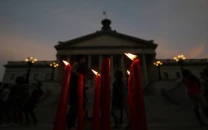Hard choices in Syria
For Syria, first priority must be to slow the tailspin triggered by its rulers. Not take action that spawns horrors.

The writer is Pakistan’s former ambassador to the US and Chair of the Jinnah Institute, Islamabad. She tweets @sherryrehman
To the rest of the world, the broad moral issue is not about whether inaction against Bashar al-Assad is unconscionable or not. That would be a clean sluice of a choice. Except to regional allies, his sell-by date as president of Syria had already been tainted by a protracted brutal civil war that forced two million into dystopic homelessness. The allegation of unleashing chemical weapons was the nail in his political coffin. But if moral choice is the standard, which alone rarely guides the actions of nation-states or coalitions, the hard choice would hinge on facing one question: How many lives would US military action secure? The political question for Americans should not be the domestic cost of tempered action, or inaction in the face of weapons of mass destruction (WMD). It should be about at least the medium term, when instead of peace breaking out after unilateral action, the global conversation will not be about chemical weapons prevention, but about post-Assad Syria and the red lines the US crosses in judging allies and enemies by different moral yardsticks.
With the wars in Iraq and Afghanistan still hanging over the global map as both divisive and inconclusive, American military options are riddled with peril. For President Obama, the publically stated red line was drawn a while ago in the brave hope of preventing President Assad’s move towards chemical weapons. Now the intents seem to be multiple. In protecting credibility and projecting American power in the face of potential WMD, he has thrown the ball into the US Congress’s political gridlock. This is seen in Washington as a smart political choice. It allows the administration to watch Syrian forces, to lend ear to both calls to caution and action, to amass flotilla muscle in the Mediterranean to mount pressure on the Syrian regime and operate with a cassus belli explicable to domestic public opinion, because, really, that is where America’s recent wars are explained. With politics becoming increasingly fractious in the US, the foreign policy calculus also gets shaped by domestic power compulsions. In the meantime, General Dempsey, Joint Chief of US Military Staff, has spelt out the costs, both military and economic, to a country in international military overstretch. But more importantly, he has warned of the unintended consequences that this war may unleash. So, the main question shaping the evolving response in Washington really should be rooted in what endgame a limited military intervention provides, which the senate has authorised.
As the countdown to a House vote builds up, Congress should look to avoiding the charge of not only arming the old enemy but investing in widening the conflict. Why? Because no rebel group will be able to transition Syria to democracy, let alone fill the power vacuum without sustained help. The Free Syrian Army’s confidence in securing Damascus, Assad’s cache of chemical weapons and preventing revenge killings is an overconfident assessment of a battlefield that is too chaotic. A punitive missile barrage whose only intent is yes, shock and awe, runs a real risk of empowering al Nusra and al Qaeda.
For Pakistan, this is as complex as it gets. The Iran-Israel stand-off will shape many responses on the Pakistani street. In the absence of any Muslim unity, the dangers of a Levantine meltdown, with Saudi Arabia and Turkey on the side of the rebels, and Hezbollah and Iran on another, will become even more perilous. It will exponentially feed the al Qaeda swamp Pakistan paid such a high price to drain. It will also drive up oil prices, and push Islamabad into facing a rising horde of conspiracy-theorists, burning American flags and walking into a convoluted psychic universe of angry people wearing ‘I am Assad’ t-shirts. Seriously.
The problem is there are no good choices in Syria right now, because it really is too late for that. History teaches us that in a void, there are no guarantees of who, or in this case, whose proxies will seize the ground. Ergo, it is crucial to calibrate a series of options that send both the right message so important to American politics, as well as to provide space for less suboptimal outcomes. These could include a range of strategic, diplomatic and humanitarian initiatives. Refugees could be given asylum, as in Sweden. Moves for defections to shake Assad out of the palace which are already under way could be ramped up. The UN could put him and his family into an international travel gulag. A business freeze with Assad supporters could be imposed. Antidotes to nerve agents can be sent to the Free Syrian Army. Political reconciliation and an American olive twig to Iran also could help bolster the view that in the region, US intent in the region is not about maximising Israeli hegemony or Iran’s isolation.
The UN should also be leveraged better, arguably the last notional meeting point for taking clear multilateral positions. Its support still carries a patina of legitimacy, which is why states spend a lot of time and money working its system. In the Syrian case, the charter does not permit military action, even if the R2P (Right to Protect) argument is used. The worry is that even if evidence of the sarin gas is found, as this is likely not an intel debacle like Iraq and its alleged WMD redux, the UN’s limits in making moral choices may still obstruct action because its Security Council will be guided by strategic rivalries. But the UN is also the best hope where a compromise between human rights, sovereignty and intervention can be thrashed out. In this process, the priority in Syria, if morality is the stated motive for military action, can be redefined as the long, tough, expensive haul needed to protect populations.
Sometimes it causes less harm to say we can’t lead the world in ways that reshape it. The sarin gas monsters prompt action. Yet states, especially superpowers, must act in ways that don’t intensify the ruinous course already set for another. For Syria now, the first priority must be to slow down a tailspin triggered by its own rulers. Not to take action that will spawn more horrors.
Published in The Express Tribune, September 7th, 2013.
Like Opinion & Editorial on Facebook, follow @ETOpEd on Twitter to receive all updates on all our daily pieces.






1644560129-0/download-(20)1644560129-0-208x130.webp)











COMMENTS
Comments are moderated and generally will be posted if they are on-topic and not abusive.
For more information, please see our Comments FAQ